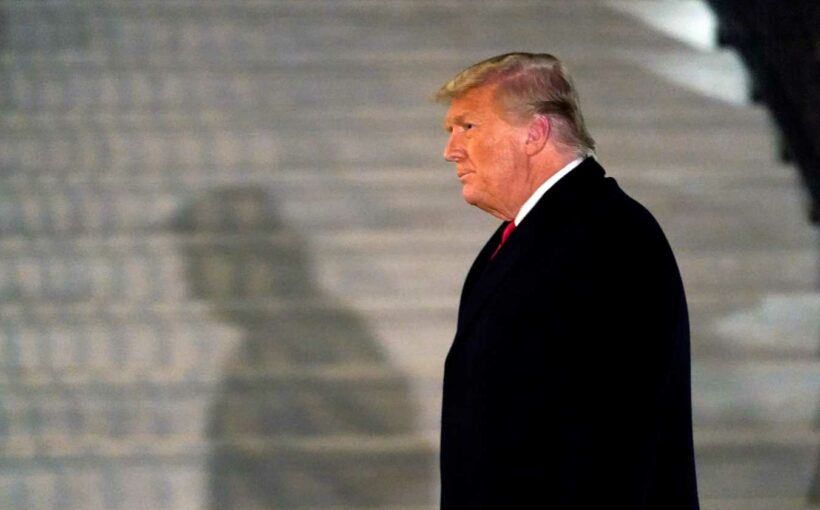WASHINGTON – Donald Trump will have to stick to written statements and media appearances to raise money and spread his messages – social media is broadly still not an option, at least for now.
Facebook’s decision to maintain its ban on Trump again deprives the ex-president of a long-range megaphone and an effective fundraising machine, elements that would be central to Trump-backed campaigns in the 2022 congressional races and, perhaps, the 2024 presidential race.
“Should he decide to run again in 2024 it will make it difficult for him to mount a cheap online campaign – as he has done in the past – and make it difficult for him to gain new supporters,” said Jennifer Mercieca, a political communications specialist at Texas A&M University.
Trump and aides indicated they would follow through on plans to start a social media platform, but provided few details. They expect Twitter and other social media platforms to follow Facebook’s lead and maintain their bans on Trump as well.
Will former President Donald Trump remain banned from Facebook and Instagram? The decision from Facebook's Oversight Board comes Wednesday. (Photo: Gerald Herbert, AP)
In his written statement following the Facebook decision, Trump called the social media bans “a total disgrace,” and he threatened vengeance on the private companies at some future date. He claimed “free speech” had been taken away from him, because the political left is “afraid of the truth.”
” …The truth will come out anyway, bigger and stronger than ever before,” he said.
With allies vowing to make “Big Tech” a major political issue, Trump said “these corrupt social media companies must pay a political price.” He was not specific about what that should be.
Trump aides insisted they can still raise money – his Save American PAC has raised more than $85 million – and his voice will continue to resonate in the 2022 elections and beyond.
A day before the Facebook decision, Trump launched a new website on which he posts his written statements, included his new comments on the maintenance of the sif the social media prohibitions.
It will be harder for Trump to communicate effectively without social media, however, given its importance in his political rise and presidency.
Trump opponents hailed the Facebook decision because the former president continues to lie about his election loss to President Joe Biden.
In a written statement Monday, Trump sought to appropriate the term others use to describe his bogus claim that the election was stolen, referring to it as “The Big Lie.”
Rick Hasen, a professor specializing in election law at the University of California at Irvine School of Law, said Trump’s communication strategy would be very different if Facebook opted to let him back on.
“He’d be writing TODAY” about false election claims in states like Arizona, Hasen tweeted, “further undermining confidence in the American electoral process.”
Days before the Facebook meeting, a social meeting flap underscored Republican divisions over Trump.
Rep. Liz Cheney, the number three Republican in House leadership, Cheney criticized Trump over his Monday statement by tweeting that anyone who is “spreading THE BIG LIE” is also “turning their back on the rule of law, and poisoning our democratic system.”
House Republicans who still support Trump are now seeking to oust her from congressional leadership.
Shortly after the Facebook decision, Trump issued a statement attacking Cheney, as well as former Vice President Mike Pence and Senate Republican leader Mitch McConnell for opposing his election protests.
While Trump’s Twitter feed was more famous – or infamous – his team made more use of Facebook to raise money and spread messages for the 2016 and 2020 campaigns,
Americans are almost evenly divided over Trump’s ban from social media – and, in a familiar pattern, most of the split is along party lines.
“Some 49% of U.S. adults say Trump’s accounts should be permanently banned from social media, while half say they should not be,” said a recent Pew Research Center poll.
The vast majority of Democrats believe Trump should be banned from social media; the vast majority of Republicans say he should be allowed on.
Facebook and others said too many of those messages were lies, including ones that helped trigger the Jan. 6 insurrection at the U.S. Capitol – an incident the Facebook board cited in maintaining its ban.
Mercieca, author of “Demagogue for President: The Rhetorical Genius of Donald Trump,” said his “loyal followers” are the one reason he still has “any political power” at all.
“So,” she added, “the ban makes it difficult for him to maintain that relationship with his followers and makes it difficult for him to redeem the Trump brand.”
Source: Read Full Article

